Tags
biography, Book Review, Brett Witter, cats, Christopher Lloyd, Deathclaw, Dewey, Dewey Readmore Books, Dewey the library cat, Dewey: The Small Town Library Cat Who Touched the World, Fall Out 4, Farm Crisis 1980s, Farm-Aid, history, Libraries, Library as Civic Center, Library's Social Function, Pea Picker Books, Spencer, Spencer Public Library, The Pagemaster, Vicki Myron
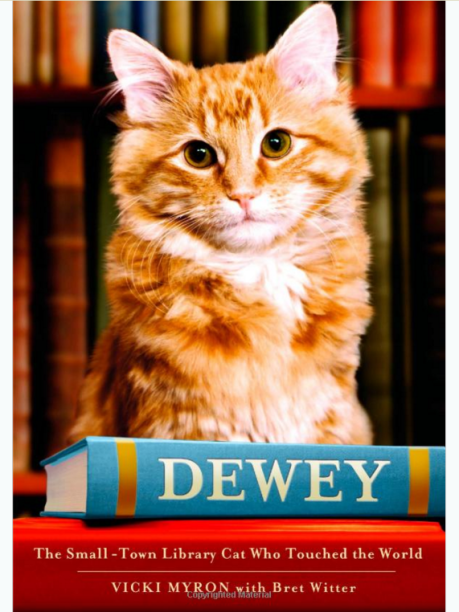
I’ve given up hope trying to buy my wife gifts, specifically books. I suspect that all bibliophiles have the same problem when they try to shop for their loved ones. They assume that their wives, husbands, parents, siblings, nephews, nieces, etc. love to read as much as they do and so when they find a book that covers a topic that their loved one is fascinated with they snatch it up, alongside three or four books they tell themselves they’ll save for Christmas. It eventually happens that said loved ones will open the present, have to quickly hide their dissatisfaction, and then wait until you’ve left to place the book on a shelf somewhere wondering why you didn’t just take the hint and buy something off of their Amazon Wish List. Much like this rotten scenario I decided one year that
 I would buy my wife a birthday present, but being a self-centered man I figured that she would enjoy a book. I was buying my father, mother, and sister a book for Christmas though in my defense they actually want books for Christmas. There’s a local bookstore in Tyler known as the Pea Picker. It’s a little hole in the wall place, half the store is nothing but Harlequin romance paperbacks, but there’s a real charm to the store and I’ve spent hours and several paychecks supporting this local business. After scouring through the classics section I decided I would look for something for my wife, and while I scanned the shelves an image of a cat struck my eye and I plucked the book up at once.
I would buy my wife a birthday present, but being a self-centered man I figured that she would enjoy a book. I was buying my father, mother, and sister a book for Christmas though in my defense they actually want books for Christmas. There’s a local bookstore in Tyler known as the Pea Picker. It’s a little hole in the wall place, half the store is nothing but Harlequin romance paperbacks, but there’s a real charm to the store and I’ve spent hours and several paychecks supporting this local business. After scouring through the classics section I decided I would look for something for my wife, and while I scanned the shelves an image of a cat struck my eye and I plucked the book up at once.
On the cover was a handsome ginger cat that reminded me of my own previous cat Sylvester, and later of an actual ginger cat my wife would adopt after he literally walked up to our front door. I read the title Dewey: The Small-Town Library Cat Who Touched the World. It was enough for me, so I bought the book, wrapped it up, gave it to her, and watched as the book collected dust on the shelf in our living room for close to two years. I didn’t realize then that my wife no longer reads books, but chooses instead to read articles, blog posts, Tumblr posts, and scientific essays on her phone instead. As such Dewey remained on the shelf, unread and unappreciated until a few month ago when I picked the book up.
While I’ve finally gotten a job teaching English at a local college, over the last month I’ve found myself thinking more and more about the local library and how much I would actually love working there. 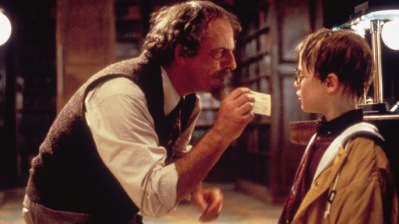 Part of this is gross romanticizing on my part, I grew up watching The Pagemaster and almost every weekend my mother would take me for story-time, but I do believe the great appeal of working there is the opportunity to participate in my community and help the library grow into something relevant and important. I love the library and what it can be. Perhaps this desire and ambition is what led me to pick up Dewey; I’m preparing myself and trying to understand what it is that a library actually does and what I would actually be doing if I actually got the chance to work there.
Part of this is gross romanticizing on my part, I grew up watching The Pagemaster and almost every weekend my mother would take me for story-time, but I do believe the great appeal of working there is the opportunity to participate in my community and help the library grow into something relevant and important. I love the library and what it can be. Perhaps this desire and ambition is what led me to pick up Dewey; I’m preparing myself and trying to understand what it is that a library actually does and what I would actually be doing if I actually got the chance to work there.
And what better way to find out than reading a story about a cat?
Dewey is mostly about Dewey the cat but it’s also largely about the author Vicki Myron. In the small town of Spencer, Iowa she worked as a librarian for about 25 years, and one morning while she was walking into the library a coworker mentioned hearing sounds coming from the book depository. It was the coldest day of the entire year and so they tried to be quick about their investigation. When they opened it up they found a small kitten
It was huddled in the front left corner of the box, its head down, it’s legs tucked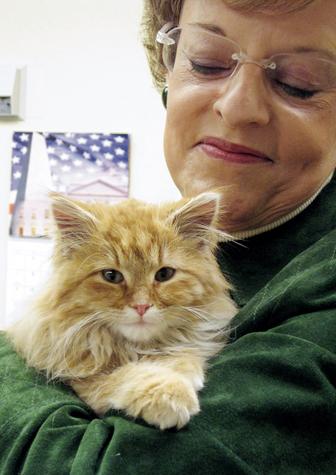 underneath it, trying to appear as small as possible. The books were piled haphazardly to the top of the box, partially hiding it from view. I lifted one gingerly for a better look. The kitten looked up at me, slowly and sadly. Then it lowered its head and sank down into its hole. It wasn’t even trying to appear tough. It wasn’t trying to hide. I don’t even think it was scared. It was just hoping to be saved.
underneath it, trying to appear as small as possible. The books were piled haphazardly to the top of the box, partially hiding it from view. I lifted one gingerly for a better look. The kitten looked up at me, slowly and sadly. Then it lowered its head and sank down into its hole. It wasn’t even trying to appear tough. It wasn’t trying to hide. I don’t even think it was scared. It was just hoping to be saved.
I know melting can be a cliché, but I think that’s what actually happened to me at that moment: I lost every bone in my body. I’m not a mushy person. I’m a single mother and a farm girl who has steered her life through hard times, but this was so, so…unexpected. (10).
This is largely the reader’s introduction to both Dewey as well as Vicki and from there the relationship is established. The reader might immediately question why they should care about a cat who lived in a library or a book which seems already to be a poorly written sentimental sob story, but I would caution them against judging the book on this initial impression.
I’m tempted to tell the reader, “Don’t judge a book by it’s cover” but that’s just…too…well, yeah too pathetic even for my humor. Besides the cover is a picture of Dewey who was a cat
It’s true that cats have skyrocketed to the top of culture in the last decade largely due to the  internet, but trying to ignore them, or their impact upon culture is a mistake for as long as humans have kept the company of domesticated animals, cats have held some spiritual, religious, or philosophic significance to said community. It’s this last observation that makes Dewey the odd and wonderful book that it is.
internet, but trying to ignore them, or their impact upon culture is a mistake for as long as humans have kept the company of domesticated animals, cats have held some spiritual, religious, or philosophic significance to said community. It’s this last observation that makes Dewey the odd and wonderful book that it is.
Cats, much like libraries, are unique creatures, and they occupy an odd territory in the community that houses them. Dewey is a book that, while it does chronicle the life of the cat who took up residence in the Spencer Public Library, it’s also often an autobiography of Vicki Byron who in her time saw trials and tribulations both for herself as well as her community. Near the start of the book she describes the Farm-Aid crisis:
Those who lived in larger cities may not remember the farm crisis of the 1980s. Maybe you remember Willie Nelson and Farm Aid. Maybe you remember reading about the collapse of family farming, about the nation moving from small growers to large factory farms that stretch for miles without a farmhouse, or even a farm-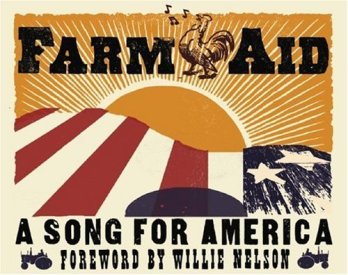 worker in sight. For most people, it was just a story, not something that affected them directly.
worker in sight. For most people, it was just a story, not something that affected them directly.
In Spencer you could feel it: in the air, in the ground, in every spoken word. We had a solid manufacturing base, but we were still a farm town. We supported, and were supported by, farmers. And on the farms, things were falling apart. These were families we knew, families that had lived in the area for generations, and we could see the strain. First they stopped coming in for new parts and machinery, making do with bootstrap repairs. Then they cut back on supplies. Finally they stopped masking mortgage payments, hoping for a booming harvest to set the account books tight. When a miracle didn’t come, the banks foreclosed. Almost half the farms in northwest Iowa went into foreclosure in the 1980s. Most of the new owners were giant farming conglomerates, out-of-state speculators, or insurance companies. (22-3).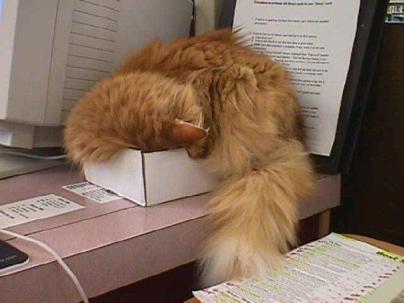
The casual reader hoping to open the book and find nothing but cute pictures of Dewey the adorable ginger library cat must have been stumped when they were greeted with the history of a local economic agricultural disaster, and later when they read about the storm of locusts that descended on Spencer and the fire which burned down most of the town in June of 1931 they may wonder what these events have to do with Dewey the cat. If it’s not clear at this point Dewey is not a book purely about a cat, it’s in fact an autobiography of a woman who is also chronicling the history of the town in which she grew up and prospered. Spencer is a town which, were it not for the book and Dewey himself, might have largely gone unnoticed to the rest of the United States, or the rest of the world for that matter. The crises that affect that community become something important to read about because, rather than just following Dewey, the reader is able to appreciate the struggles that face small agricultural based cities in the Midwest; communities that, it should be noted, often are left unobserved by the culture of the nation because they are “out there” and “away” from the glamour of big cities.
And, if I can segway back for a moment, Myron does an incredible job of demonstrating how similar that apathy for that Midwest small town mirrors apathy to the library and why that apathy is misplaced. She says in a later passage: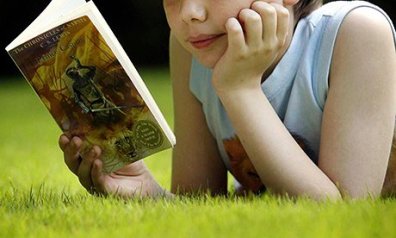
A great library doesn’t have to be big or beautiful. It doesn’t have to have the best facilities or the most efficient staff or the most users. A great library provides. It is enmeshed in the life of a community in a way that makes it indistinguishable. A great library is one nobody notices because it is always there, and it always has what people need. (116)
Further on in the book Myron continues this point:
A librarian clerk’s job used to involve filing and answering reference questions. Now it’s understanding computers and imputing data. To keep track of usage, the clerk working the circulation desk used to make a hash mark on a piece of paper every time a patron entered the library. You can imagine how accurate that system was, especially when the library was busy and the clerk was answering reference questions. Now we have an electronic clicker that records every person who comes through the door. The checkout system tells us exactly how many books, games, and movies come and go and tracks which items are the most popular and which haven’t been touched in years. (163)
I could, and will at some point, gush on and on about the benefit a library has to its community in terms of resources and morale boosting, but that would be getting away from Dewey and Myron who, as I read the book one chapter every morning before work, began to grow on me. Each morning I could look forward to reading small anecdotes of Dewey eating rubber bands or Arby’s sandwiches, pointed with small sections like the previous quote which would remind me why libraries matter so much, especially to small communities, and finally there was a simple joy in reading the life of Myron who suffered with her own demons including an early marriage to a man who suffered from chronic alcoholism. Along with this Myron also eventually underwent a hysterectomy (Removal of the uterus).
Myron doesn’t hold back her feeling as she describes this last event and she describes giving birth to her daughter and the complications that ensued:
I had always wanted a daughter named Jodi Marie. I had dreamed about it from a young age. Now I had a daughter, Jodi Marie Myron, and I was dying to spend time with her, to hug her and talk to her and look into her eyes. But the surgery had knocked me flat on my back. My hormones went haywire, and I was racked with headaches, insomnia, and cold sweats. Two years and six operations later my health hadn’t improved, so my doctor suggested exploratory surgery. I woke up in the hospital bed to discover he’d taken both ovaries and my uterus. The physical pain was intense, but worse was the knowledge that I couldn’t have any more children. I had expected a peek inside; I wasn’t prepared to be hollowed out. And I wasn’t prepared to enter sudden and severe menopause. (88)
As a man, there are ailments that I will never understand. This does not mean I don’t try and develop empathy however, and this impulse has helped me in life. Working in the Writing Center at UT Tyler, most of my co-workers, in fact nearly all of my co-workers were women and so between the sessions when it was just the tutors, conversations would spring up and sometimes the issue of periods and menstruation came to dominate the conversation. Unlike most of the men I have met in my life who practically shriek at the mere mention of menstrual blood, I simply don’t care, and this in turn allowed me to listen as my female coworkers discuss the “pain in the ass” or actual physical and psychological pain associated with their vaginas and the complications other women have. It doesn’t hurt either that my wife reads me testimonies of women online who discuss freely and frankly their personal horror stories with uterine problems, often when I’m trying to kill raiders or Deathclaws in Fallout 4.
This is all a way of saying reading this passage I was properly horrified by Myron’s personal loss and didn’t just tune out because it was “lady-problems.” Myron’s book, as I’ve said before, is a personal biography of what the library, and what a stray cat she found one morning while working at the library meant for her. Though I recognize my reader is getting impatient and has to ask the inevitable question.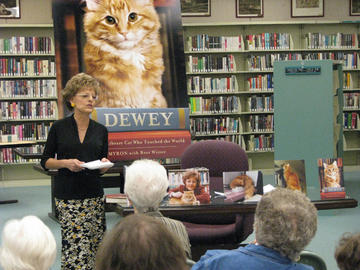
So what? Why should I spend my time reading about a cat and a woman from the Midwest who worked in a library that nobody ever heard or cared about?
The problem dear reader is that the world did care about it. Dewey became an international celebrity and Myron describes tourists from Japan, Germany, and even parts of the United States who came to the Spencer Public Library because of the story of Dewey. In his time the cat became a celebrity and brought attention to a small town that otherwise would have just become another part of “Out There” for the rest of the United States. And if I can reflect some of this back at the reader, the very attitude reveals a larger fundamental problem. Libraries, and the people who work there, fill a real social function, and for most of their efforts they largely go underappreciated. It took a cat, granted a gorgeous charismatic one, but a cat nonetheless for people to give a shred of a shit.
As humans have evolved, certain organisms have evolved alongside us shifting and changing their biological niche to fit their environment. Dewey, much like Vicki Myron herself, and much like libraries in general come to embody the fundamental component of life which is change. Change is neither good nor bad, it all depends on the method and ultimate result of change. Dewey is a book that is worth the reader’s time because it a great personal narrative about how a life can undergo dramatic and minuscule changes.
And really, I should be as real here as humanly possible, Dewey is a largely sentimental book about a cat in a library in a small town, and while I detest sentiment as an aesthetic tool, Dewey is rich with small moments that leave the reader feeling generally happy. One such moment is when Myron describes Dewey waving at her whenever she would arrive at the library:
Every morning since his first week in the library, Dewey had waited for me at the front door. He would stare at me as I approached, then turn and run for his food bowl when I opened the door. Then, on one of the worst mornings of that terrible two years, he started waving. Yes, waving. I stopped and looked at him. He stopped and looked at me, then started waving again.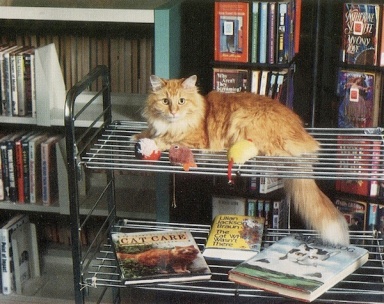
It happened the next morning, too. And the next. And the next, until finally I understood this was our new routine. For the rest of his life, as soon as Dewey saw my car pull into the parking lot, he started scratching his right paw o the front door. The wave continued as I crossed the street and approached the door. It wasn’t frantic. He wasn’t meowing or pacing. He was sitting very still and waving at me, as if welcoming me to the library and, at the same time, reminding me he was there. As if I could ever forget. (192).
Normally somebody telling another person about the eccentricities of their cats is the stuff of nausea and bad sitcom writing. Social media and the internet is inundated with pictures of cats, and gifs (jif? gif? xif?) of cats performing outrageous stunts, and yes we have all seen the video of the kitten having his tummy tickled. Despite all of this, 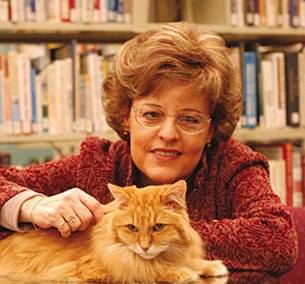 life is built up of small, seemingly random and meaningless experiences that collect over time to build a life. Take a moment to appreciate something like the story of a cute ginger cat being saved outside a library, or the life story of a woman who overcame great personal loss to find meaning in her life, or else just reading about how a library came to mean so much to the people of the world who often forget about the small little towns is worth your time.
life is built up of small, seemingly random and meaningless experiences that collect over time to build a life. Take a moment to appreciate something like the story of a cute ginger cat being saved outside a library, or the life story of a woman who overcame great personal loss to find meaning in her life, or else just reading about how a library came to mean so much to the people of the world who often forget about the small little towns is worth your time.
Little moments in libraries can endure in memory and lift us when we need it most. And if your grandmother gets you a book about a cat who lived in a small library in Iowa for Christmas instead of that new Galaxy phone that you wanted, don’t be in such a rush to shelve it and forget about it. You might discover like I did what your true calling may be.
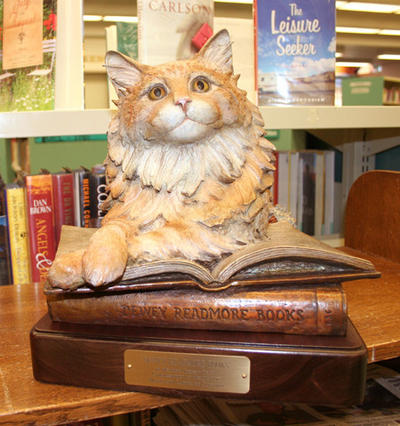

I just read the first book about Dewey. Although I enjoyed immensely the book in its entirety, what I most relate to is Deweys demise which is similar to my life now – my husband has Stage IV colorectal cancer and this book helped me or brought it all home in a unusual relevant life happening normal style.
LikeLiked by 1 person